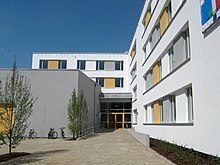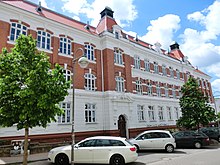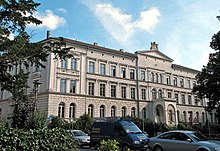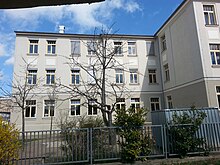Jenaplan School Rostock
| Jenaplan School Rostock | |
|---|---|

|
|
| type of school | Integrated comprehensive school with elementary school and upper secondary school |
| founding | 1996 |
| address |
Lindenstrasse 3a |
| place | Rostock |
| country | Mecklenburg-Western Pomerania |
| Country | Germany |
| carrier | Hanseatic City of Rostock |
| student | 768 (as of 2017/18) |
| management | Martin Plant |
| Website | www.jenaplan-rostock.de |
The Jenaplan School in Rostock is an integrated comprehensive school with a primary school and an upper secondary school that is currently being established in Rostock . Your school concept is based on Peter Petersen's “ Jenaplan ” . This makes it one of the few state schools with a reform pedagogical school program. In 2015, the Jenaplan School in Rostock was awarded the German School Prize of the Robert Bosch Foundation .
history

The Jenaplan School was founded as a branch of the elementary school on Margaretenplatz. At the beginning of the 1996/97 school year, 27 1st and 2nd grade students were taught for the first time according to the basic principles of the Jenaplan by Peter Petersen. The classrooms were in the building of today's Frieda 23 in the Kröpeliner-Tor-Vorstadt .
In 2000 it became an independent elementary school under the name Jenaplanschule Peter Petersen Rostock . In 2004 the company moved to the Margaretenschule building on Barnstorfer Weg, also in the Kröpeliner-Tor suburb. At the same time, as part of the “longer learning together” program, classes were taught up to grade six for the first time. After the Jenaplan School had grown steadily, in April 2007 it again moved to the building of the Great City School in Wallstrasse in the center of Rostock . Jenaplanschule has been an integrated comprehensive school with elementary school since 2008/2009, but initially without upper secondary level . Up to 2015/2016, six sub-groups (cross-year core groups for grades 1–3), five middle groups (grades 4–6) and two upper groups (grades 7–8) were taught.
After that, a new group was gradually added every year. In the 2019/20 school year there were six subgroups, six middle groups and four main groups at the Lindenstrasse location. At the Blücherstrasse site there were three subgroups, two middle groups, four youth groups and two upper secondary level groups.
In July 2009, the Jenaplan School moved to its own school building in Lindenstrasse ( city center ) for the first time, which it no longer had to share with another school. In 2014 the school name was changed to Jenaplanschule Rostock .
In 2015, the Jenaplan School in Rostock was awarded the German School Prize of the Robert Bosch Foundation . In 2016 it received the award as a MINT school in Mecklenburg-Western Pomerania for "a large number of above-average activities in the MINT subjects of mathematics, computer science, natural sciences and technology within and outside of the classroom".
Since the 2017/18 school year, the Jenaplan School has been expanded to include an upper level . That is why it became necessary to move to a second location on Blücherstrasse. The Jenaplan School was aiming for the Abitur after the 13th grade in order to be able to offer extracurricular lessons and other elements of the school concept to the same extent in the upper grades. However, the Ministry of Education stipulated that the Abitur should be taken after the 12th grade . The first class of high school graduates left Jenaplan School in 2019.
Development of the number of pupils and grades
| school year | student | Grades | Home groups |
|---|---|---|---|
| 1996/97 | 27 | 1-2 | 1 |
| 1997/98 | 39 | 1-3 | |
| 1998/99 | 43 | 1-4 | |
| 1999/00 | 54 | 1-4 | 3 |
| 2001/02 | 1-4 | 5 | |
| 2004/05 | 99 | 1-6 | 8th |
| 2005/06 | 158 | 1-6 | |
| 2006/07 | 176 | 1-6 | |
| 2007/08 | 216 | 1-8 | 13 |
| 2009/10 | 255 | 1-9 | |
| 2010/11 | 292 | 1-10 | |
| 2011/12 | 319 | 1-10 | |
| 2012/13 | 359 | 1-10 | |
| 2013/14 | 385 | 1-10 | |
| 2014/15 | 425 | 1-10 | 17th |
| 2015/16 | 463 | 1-10 | |
| 2016/17 | 528 | 1-10 | |
| 2017/18 | 768 | 1-11 | |
| 2018/19 | 1-12 |
School profile
The contents of the state framework plan of the state of Mecklenburg-Western Pomerania are integrated into the school's internal curriculum, but the organization and the forms of teaching have considerable peculiarities compared to normal regular schools .
One is cross-year learning. Instead of in grade classes , the students in grades 1–3 (subgroups), 4–6 (middle groups), 7–8 (upper groups) and 9–10 (youth groups) each learn together in so-called core groups. At the start of the school year, 2/3 or half of the pupils from the senior group remain in the group. As a result, the concept of learning through teaching for the older students in a home group plays an important role. However, some subjects, such as foreign languages, are taught at different ages .
Due to the combination of primary school and comprehensive school up to secondary level II, the two-time change of school (type) that is common in regular school operations in Mecklenburg-Western Pomerania to the orientation level after the fourth grade and to a secondary school after the sixth grade is not necessary for the students of the Jenaplan School.
In the subgroups, the workshop lessons according to Jürgen Reichen are predominantly used . This includes interdisciplinary work on technical, mathematical, musical-artistic or linguistic topics. German is taught according to the principle of reading by writing . From the first grade onwards, great importance is attached to independent learning with open lessons and free work, as well as the ability to plan the weekly schedule independently . Other important components of Jenaplan pedagogy are partner and group work as well as discussions in the morning group . The presentation of the results of independent learning is already practiced regularly in the first grade.
Usually, tests or class work are not carried out on a common date for all students, but rather the individual student registers with the teacher for learning progress checks (see learning counter ). The learning pace can thus be largely individualized . Depending on their learning development, a student can go through the normally three-year lower or middle group in two or four years, and the two-year upper and youth group in one or three years. However, there is no such thing as sitting down . The Jenaplan School experiments in the subgroups with grade-free verbal assessments .
Lessons at extracurricular learning locations , project and workshop lessons as well as subject-related lessons play a major role in all grades . In the middle groups, multi-week interdisciplinary projects in "networked lessons" with five hours per week form an important component of the lesson. Another special feature is the "experiential teaching" with two hours a week in the afternoon with extra-curricular content that corresponds to the inclinations of the students. In the main groups, the practical project day, which runs for half a year, represents an important teaching unit, in which usually a whole school day is worked at extracurricular learning locations every week.
There is a close cooperation with the vocational school for service and trade. Another cooperation exists between the Jenaplan School and the Rostock Conservatory , where the pupils of the lower and middle groups can learn violin or recorder during class time, and other wind instruments in the 4th grade. The sixth grades take part in a one-week exchange with a Danish partner school every year .
As a rule, there is no homework ; instead, tasks in the weekly schedule are completed during class time and up to fourth grade in the afternoon working hours, which are part of the after-school care center. The children decide for themselves at what time and for how long they go to work and which tasks and workshops they want to complete or finish.
Day care center and school association
Carrier of the hoard is the school association of Jenaplanschule. The after-school care center shares the rooms with the school, works according to the principle of open after-school care and offers a wide range of courses.
Awards
- 2015 winner of the German School Prize of the Robert Bosch Foundation
- 2016 Awarded as a MINT school in Mecklenburg-Western Pomerania
school-building
The building was built in 1912 for 1876 as a scientific high school branch of the Great City School founded grammar school Rostock completed. In 1919 the Realgymnasium was named school to the seven lime trees (also known as the seven lime tree school or linden school for short ). Adjacent was the Realschule (also called Blücherschule), which was built in 1884, but the building was totally destroyed in air raids in 1942/43 . The secondary school at that time was also damaged, but could only be renovated in 1944. After 1945, the workers and farmers faculty first used the building , later an extended secondary school (EOS) and after 1991 parts of the large city school . The building was converted from 2008 to 2010 according to plans by the architect André Keipke.
Web links
- Homepage of the Jenaplan School in Rostock
- Portrait of the Jenaplan School in Rostock on the website of the German School Prize
- School concept of the Jenaplan School (PDF, 253 kB)
literature
- Learn from each other in: great! The school magazine for Mecklenburg-Western Pomerania , school year 2016/2017, ed. v. Ministry of Education, Science and Culture Mecklenburg-Western Pomerania, pp. 29–32
Individual evidence
- ↑ School development plan of the general education schools in the Hanseatic City of Rostock 4th update , 2018, p. 167
- ↑ www.jenaplan-rostock.de: School chronicle
- ↑ a b www.mint-schule-mecklenburg-vorpommern.de: Jenaplanschule Rostock
- ↑ Information according to the school chronicle on the Jenaplan School homepage or as part of the forecast of student numbers by the Hanseatic City of Rostock ( memento of the original from October 17, 2017 in the Internet Archive ) Info: The archive link was inserted automatically and has not yet been checked. Please check the original and archive link according to the instructions and then remove this notice. . Information for the 2015 / 16–2017 / 18 school year according to the school development plan of the general education schools in the Hanseatic City of Rostock 4th update , 2018, p. 165
- ↑ Represented in detail in the school concept of the Jenaplan School (PDF, 253 kB)
- ↑ Learn from each other in: great! The school magazine for Mecklenburg-Western Pomerania , school year 2016/2017, ed. v. Ministry of Education, Science and Culture Mecklenburg-Western Pomerania, p. 30


